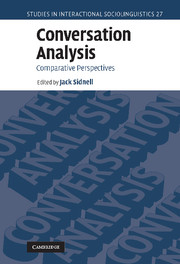Book contents
- Frontmatter
- Contents
- List of figures
- List of tables
- List of contributors
- Transcription conventions
- Part I Introduction
- Part II Repair and beyond
- Part III Aspects of response
- 5 Projecting nonalignment in conversation
- 6 Two answers to inapposite inquiries
- 7 Gaze, questioning, and culture
- 8 Negotiating boundaries in talk
- Part IV Action formation and sequencing
- Part V Conclusion
- Bibliography
- Index
7 - Gaze, questioning, and culture
Published online by Cambridge University Press: 15 December 2009
- Frontmatter
- Contents
- List of figures
- List of tables
- List of contributors
- Transcription conventions
- Part I Introduction
- Part II Repair and beyond
- Part III Aspects of response
- 5 Projecting nonalignment in conversation
- 6 Two answers to inapposite inquiries
- 7 Gaze, questioning, and culture
- 8 Negotiating boundaries in talk
- Part IV Action formation and sequencing
- Part V Conclusion
- Bibliography
- Index
Summary
“There is nothing so brutally shocking, nor so little forgiven, as seeming inattention to the person who is speaking to you […] I have seen many people who, when you are speaking to them, instead of looking at, and attending you, fix their eyes upon the ceiling or some other part of the room […] Nothing discovers a little, futile, frivolous mind more than this, and nothing is so offensively ill-bred.”
Lord Chesterfield 1752 (Letters to his son, Letter CCLXXVIII)Introduction
This chapter is about gaze behavior in conversation. Using data from three unrelated cultures (or more properly, speech communities), we ask whether there are, on the basis of these three cultures, plausible candidates for universal patterns of gazing during interaction, and where, on the contrary, we may expect to find culturally specific patterns. This focus is already rather different than the tenor of most of the other papers in this volume. Moreover, because of this focus, a central part is played by basic descriptive statistics, rather than the qualitative analysis of specific episodes.
Despite these foci and the methods adopted, we see this paper as addressing some central issues posed by conversation analysis (CA). We are interested in a pervasive conversational practice, namely when participants gaze at one another during conversation. There has been relatively little published work in CA on the systematics of gaze, and what there has been (e.g., by Goodwin 1981) will be shown by our data not to provide a possible general analysis of the phenomena.
- Type
- Chapter
- Information
- Conversation AnalysisComparative Perspectives, pp. 187 - 249Publisher: Cambridge University PressPrint publication year: 2009
- 88
- Cited by



